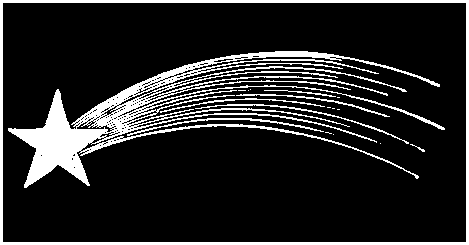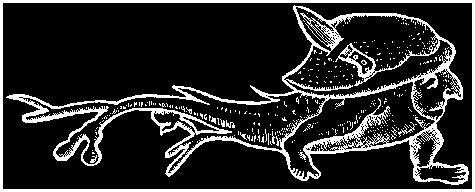
Sixteen Stars
From the Pages ofRALPHBelow, you will find a list of
what we believe to be
the best titles of 2006 ---
those that received our
much sought-after

SILVER STAR
(for excellence in
style, content, verve,
originality, and overall design.)There are over 200 photographs of the art of Rockefeller Center, along with works in progress and photographs of the creators at work. Some of the later sculptures, especially those of Michio Ihara and Isamu Noguchi, make you wish the Rockefellers and their heirs and assigns had stopped while they were ahead, Still, the color photographs along with black-and-white shots of the original process of creation make this collection a dream. And for this critic, the discovery of Lee Lawrie's fragrant blend of color, form, and contrast make it all worth while.
Cottage
Water
Systems
An Out-of-the-City
Guide To Pumps, Plumbing,
Water Purification, and Privies
Max Burns
(Cottage Life Books)Burns confesses to an affection for outhouses ... "backhouse, biffy, privy, or whatever one wants to call it." He titles it "the original restroom,"a moment in silent repose, outhouse door jammed open as it usually is, contemplating absolutely nothing as seven ruffled grouse balanced awkwardly on the top twigs of the nearest birch tree, doing the same as me.
He points out that a well-constructed privy is far more environmentally friendly than a septic system, for a "fluid" system leaches many more contaminants into the ground water.He offers plans for three outhouses --- the pit privy, the vault privy, and the pail privy --- and gives exact building instructions and dimensions. He suggests preferred materials for the walls of the pit (old brick, cement blocks, fir), and even quotes --- what research! --- from a USDA farmer's bulletin of 1928 that states that "each American is responsible for expelling just under half-a-ton of personal body sewage each year."Years ago, I remember asking one of my English teachers about the mystical underpinnings of A Passage to India, especially the riddle of the ghosts and the secret of the Marabar Caves. My professor poo-poohed it for, after all, the teachings of Suzuki, Watts, much less Maharaji Mahesh Yogi had not yet invaded the West.I now see that we were victims of a prevailing western shame of the mysterious. A Passage to India is heavy with overtones of the otherworldly. I would guess that the Marabar caves overwhelmed our 1950s professors with a too-strange echo of the great gap between east and west.
In this more than superb recording, we can share the spell the mystery weaves with character, culture, and plot twists ... a literary mystery so intricate and yet so self-evident that we never want it to end, want the story to stretch on forever, like the Marabar Caves themselves; stretching into the past, into the future, without end, filled with nothing but the profoundest echoes of nothing.
Maybe we'll never figure out why this story of a faceless painter from a century-and-a-half ago, told in a mere ninety pages, has such power ... the power to turn the reader (one reader, at least) inside-out. Is it the expert interweaving of landscape and history and a skewed, painterly vision that robs one of the need to see things straight? What kind of diabolical art is this?It may be Aria's word-power: the ability to take words (even through the veil of translation) and push us --- sometimes puzzled; sometimes unwilling --- into distant, obscure worlds. 1838. The pampa. Argentina: "The mysterious emptiness to be found on the endless plains at a point equidistant from the horizons."
We have spoken with wonder and (indeed) approbation of Marías before, but it is only with Written Lives that we find he is a top-drawer critic as well, much in the mold of Kenneth Rexroth, D. H. Lawrence, and Umberto Eco. His loves are bountiful; his loathings deep. The writers he most disdains are Joyce, Mann, and Mishima. "The death of Yukio Mishima was so spectacular that it has almost succeeded in obliterating the many other stupid things he did in his life."Unlike so much literary criticism, Marías is a treat to read. His observations are sharp and astute; his phrasing can border on the wonderful. Bosie, Oscar Wilde's lover, was "long on ringlets and short on intelligence."
Crawford's poetic meditations are the Northwest and the sun come up or gone down and gill nets and dogs and trailers (and dogs in trailers) and stupas and the Williamette (he's from Oregon) and the Divine Space (where there is no space).It's the East in spades: men packing "pig's faces," extra-terrestrial activities ("I was some kind of car/backing out of my body") and the I Ching and a series of very charming (and funny) poems from his previous life when he lived in China ("China is toothless/and retired in Ciqikou.")
Our definition of good poetry is that it's like Fritos: you can't just eat one, you want more (and even, maybe, you want to go to China to see what he saw).
Arresting Time:
Erich Lessing
Reportage Photographs
1948 - 1973
Alastair Crawford, Editor
(Quantuck Lane Press/Norton)How did Erich Lessing come up with such fine black-and-white photographs......photographs that tell a story, not too little, not too much? How many shots did he have to make in his twenty-five years of reportage to come up with the 400 or so that appear in this book? Which did he print, which did he cut, which did he throw away? Will we know, will we ever know? (And does it even make any sense to ask?)
Gill writes that present-day Cuba is the country "Joni Mitchell, Timothy Leary, and Bob Dylan would have designed if anyone had been foolish enough to give them a country to tinker with."But he is at his most persuasive when he is reporting simply but elegantly. For instance, in the midst of a famine in the Sudan: "A gaggle of girls walk beside me, straight backs and high breasts. They move with an easy, undulating rhythm. Little plumes of dust are kicked up by their feet."
They flirt. Nobody prepares you for flirting in a famine. While there is life, there is still living. One strides close and does a rolling lumpen imitation of my gait, and her friends bridle and shimmy in peals of laughter. With long strong fingers, she touches her heart and then her lips and gives me a glowing white smile.
Timothy;
Or, Notes of
An Abject Reptile
Verlyn Klinkenborg
Josephine Bailey,
Reader
(Tantor --- 5 CDs)Books, as one of my friends says, are there to be sniffed, peeled, and then eaten --- but it is rare that I gorge on one before breakfast. I certainly did with Timothy. My advantage was not having to eat it, but having it read to me by Josephine Bailey. She's the consummate commute companion, the best one could ask for. She speaks an elegant, impeccable English, reading to us as if she were a bit tired by life (as Timothy certainly was), a bittersweet elegance in her voice.I was puzzled to find Timothy being voiced by an older woman until Timothy reveals to us fairly late in the story that he is really an older woman ... an older woman-in-a-shell, that is. Mr. Gilbert White --- our solitary naturalist --- never figures out that his Timothy is a she.

Philip Roth being Philip Roth, it seems that some critics were expecting maybe a wrinkled version of Portnoy's Complaint. But this one is not about a frustrated, jerk-off kid and his psychiatrist. It is about you and me and every man and every woman getting old, losing our beauty, regretting some of the choices we've made, living with a body that is going awry, being envious of those who are still healthy.Too, there is astonishment that --- when we see a young runner going down the boardwalk, we find ourselves getting aroused, trying (comically, in some batty way) to make the old seduction moves, the ones that always worked before; you and this twenties-something lovely: sweating, nice eyes, perfect body.
And you seventy.
April and December.
He was young, smart, beautiful and adept in French. An encounter the first week with the lithographer Adolf Dehn opened the door to his meeting, eating with, drinking with, sometimes sleeping with the hundreds of hungry, smart, opportunistic, charismatic characters who hung out in Montparnasse --- the likes of Hemingway, Joyce, Kay Boyle, e. e. cummings, Gertrude Stein, Ford Maddox Ford, Alan Tate, Marcel Duchamp.The meals. The drinking. The love ... And the literary talk: "Not that I'm wholly against boredom in literature," says Ford Maddox Ford, at a noisy party: "It has its place --- Arnold Bennett and Compton MacKensie have shown us that ... But they're not great bores, my dear fellow."Now Dickens, for instance among his other supreme accomplishments, can be tedious on a really grand scale. He has created at least two of the supreme bores in English literature, Mr. Peggotty and Stephen Blackpool. Like everything of Dickens, their stature is epic, mythological. Besides them, Jean Valjean and Lambert Strether are quite insignificant.
Pepys is a man who enjoys himself to the hilt, but, at the same time, he is filled with fears. One is of his wife who shrewdly watches his every move. He is also wary of becoming a drunkard (he takes the pledge often). And, being a man of 17th Century England, he is terrified of fire, the plague, the "pox," the Divine (he regularly notes Sundays in the diaries as "the Lord's Day"), and any favor or disfavor at the royal court of Charles Stuart.And the intimacies he shares with us! Sometimes more than we want to know: He tells us of "being lousy," of problems with his bowels, and of problems with his bladder (he celebrates annually "the cutting of the stone" --- surgical removal a kidney stone --- which he carries about with him in a felt-lined box, to show to friends and strangers alike).
Graham is two people (maybe more; maybe even, unknown to us, a cold-war spook). He is obviously a wise, studious, and learned professional in his rather stuffy field. But, a miracle: he is also a natural adventure writer.Given the built-in terror that was part of the Soviet/US landscape for over forty years, his comings and goings, and his obvious charm, infuse the reader with an undercurrent of dread. "How is this nutty professor going to get out of this pickle?" we find ourselves thinking. Such as when two KGB agents grab him, take him far outside of Moscow to a restaurant which the author is quite sure will turn into a set-up, which could get him nabbed, possibly put under house arrest or worse.
How does he get out from under? He uses his natural running ability --- he is a long-time jogger --- to slip out of the back of the restaurant. He runs to the Moscow highway, stops a passing car by waving a fistful of rubles in the air, and thus makes it back to the Metropole Hotel and safety.
 She reminds us of e. e. cummings: funny, sly, shy to condemn, wondering, wondering, always wondering ... why, for instance "we have a soul at times" but "no one's got it non-stop,/for keeps."She also brings to mind Lawrence Ferlinghetti before he got swept up by Too Much Fame. She got Fame, too, but evidently, unlike him, it did not upset her balance, nor her wistfulness, especially when we find her writing lines like,"let's act like very special guests of honor
She reminds us of e. e. cummings: funny, sly, shy to condemn, wondering, wondering, always wondering ... why, for instance "we have a soul at times" but "no one's got it non-stop,/for keeps."She also brings to mind Lawrence Ferlinghetti before he got swept up by Too Much Fame. She got Fame, too, but evidently, unlike him, it did not upset her balance, nor her wistfulness, especially when we find her writing lines like,"let's act like very special guests of honor
at the district fireman's ball,
dance to the beat of the local oompah band,
and pretend that it's the ball
to end all balls."I can't speak for others ---
for me this is
misery and happiness enough:"just this sleepy backwater
where even the stars have time to burn
while winking at us
unintentionally."It is those leaps (the dance, the stars, the oompah band) that make us want to ring her up right this minute and invite her to the annual Carpathian Firemen's Ball; or perhaps, if she is adverse to a night dancing the polka, to spend a few hours lying about her yard gazing at Orion winking. Unintentionally.
David Romtvedt who, as far as we can figure, writes poetry that might possibly be prose --- but it is filled with such kindness, even awe, that it makes no difference. Thus he can offer meditations on building steps, anti-drinking posters in high school, slugs copulating, mushroom clouds and his daughter, traveling through a town in Chile named Beso ("Kiss"), and going, after all these years, to a Dylan concert:"so I drove down, blowin' in the wind
and the times they are a changing, me
and a bunch of fifty-something-year-olds
remembering when we were young
and so was Dylan and maybe something
really might change."
Here we become aides to Konrad Sejer and his young assistant, Jacob Skarre. Every clue that turns up gets us to thinking, well this does point to Annie's old gym teacher, Kurt, doesn't it? After all, he was convicted of rape ten years ago. No, it has to be young Halvor, Annie's ex: he was beaten so regularly by his drunken father that he has a big scar on his face where the old man cut him. He certainly has a hate going, right?But surely it can't be the elegant rug-merchant Jonas, even though he was the last to see Annie alive. He is so forthcoming. Who could possibly accuse him?
The mystery of a good mystery writer is how he or she leaks out the action and the information in a way to keep us going, and, then, at the end, sews everything up so neatly, in a package, so we are thinking, "Whew!" It is a relief.
Finally: you and I have read much, perhaps too much, about Hurricane Katrina. Joshua Clark's "His Picture Nowhere" about his visit to Buras, Louisana three weeks after the fact is so good I'll probably screw it up if I try to tell you anything about it. It's funny and sad, so directly there that you can taste it and smell it and feel, intimately, what it was like, you and Clark and Alcedia looking for her "granddaddy's picture" in Buras: the three of you, along with the silence, which "you expected at any moment to be filled with the bird's call that unfailingly swoons into the quietest pockets of the world."And I wondered what thing would be the first to claim this silence.